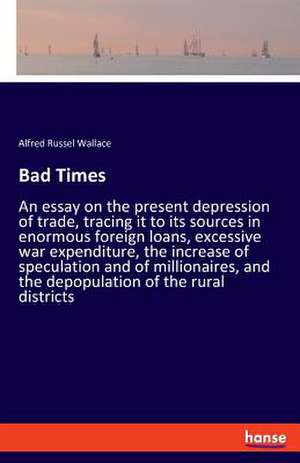Bad Times
Autor Alfred Russel Wallaceen Limba Engleză Paperback – 18 sep 2018
| Toate formatele și edițiile | Preț | Express |
|---|---|---|
| Paperback (2) | 138.32 lei 3-5 săpt. | |
| Hansebooks – 18 sep 2018 | 138.32 lei 3-5 săpt. | |
| Kessinger Publishing – 15 oct 2009 | 188.15 lei 38-44 zile |
Preț: 138.32 lei
Nou
Puncte Express: 207
Preț estimativ în valută:
26.47€ • 27.53$ • 21.85£
26.47€ • 27.53$ • 21.85£
Carte disponibilă
Livrare economică 24 martie-07 aprilie
Preluare comenzi: 021 569.72.76
Specificații
ISBN-13: 9783337438845
ISBN-10: 3337438849
Pagini: 140
Dimensiuni: 140 x 216 x 11 mm
Greutate: 0.19 kg
Editura: Hansebooks
ISBN-10: 3337438849
Pagini: 140
Dimensiuni: 140 x 216 x 11 mm
Greutate: 0.19 kg
Editura: Hansebooks
Notă biografică
Alfred Russel Wallace was an English naturalist, explorer, geographer, anthropologist, biologist, and illustrator who lived from 8 January 1823 to 7 November 1913. His own development of the theory of evolution through natural selection is what made him most famous. Charles Darwin's earlier papers on the subject were also excerpted in his 1858 paper, which was published in the same year. In response, Darwin rapidly wrote an abstract of the "great species book" he was composing, which he then published in 1859 as "On the Origin of Species. Beginning in the Amazon River basin, Wallace conducted considerable fieldwork. The Wallace Line, which divides the Indonesian archipelago into two distinct parts and is now known as the Wallace Line, was discovered by him while conducting fieldwork in the Malay Archipelago. In the western portion, where the animals are large and of Asian origin, and in the eastern portion, where the fauna reflects Australasia. He is frequently referred to as the "father of biogeography," or more specifically, of zoogeography, and was thought to be the foremost authority on the geographic distribution of animal species in the 19th century.
